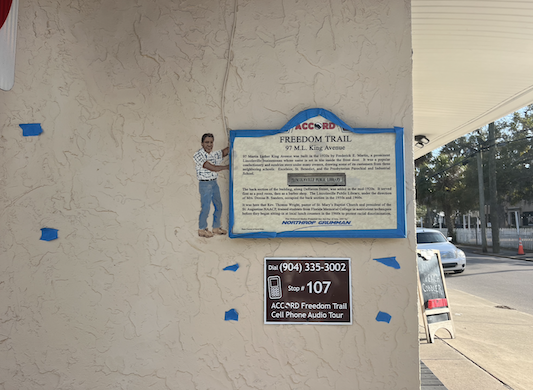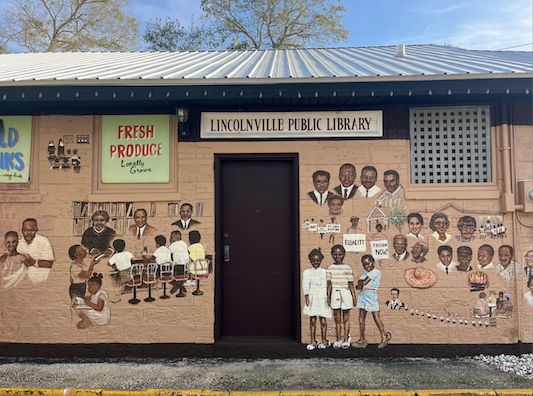By Olivia Lockett
The story of civil rights in St. Augustine isn’t just history- it’s alive in Lincolnville, where the past still echoes through its streets and people. The neighborhood, founded in 1866 by formerly enslaved people after the Civil War, has a history that isn’t confined to museum exhibits.
The ACCORD Freedom Trail, which begins at 79 Bridge St., is a self-guided tour following 31 markers located at significant historical sites throughout St. Augustine. It not only educates tourists about the past, but also connects them with the community that continues to honor its legacy.
Local artist Nancy Christensen has been part of the Lincolnville community for over 20 years, and she illustrated two of the Freedom Trails’ sites. She is working on a large mural along the walls of the Corner Market at 97 Martin Luther King Ave. to honor St. Augustine civil rights activists.
“This mural is one of the many ways we can step in and say that these people are really worth recognizing,” Christensen said. “This small community makes people much more intimate than most American cities. There’s something very nice about rubbing shoulders with other people. It’s a very humanly nourishing place.”
St. Augustine’s role in the civil rights movement is often overshadowed by its other tourism draws, but its history is deeply influential and respected by the cities’ locals.

Understanding this history is crucial to appreciating the broader movement and its impact on the city, said Kristine Warrenburg Rome, a Flagler College professor.
“I hope that with the monuments and markers of the Freedom Trail, you start to see at least one layer of that conversation happening. That marker can be the beginning of conversations to help with the reconciliation of the civil rights story in totality,” Rome said.
The trails’ sites include homes of activists, targets of firebombing attacks, meeting places of boycotts and sit-ins, the original St. Augustine office of the NAACP (National Association for the Advancement of Colored People) and more.
A Freedom Trail marker honors a building with a long standing history in the Civil Rights Movement. 97 Martin Luther King Ave. has served as a confectionary store, a pool room, a barber shop and a training place for nonviolent protest techniques.

Anyone who partakes in the trail walks away with a deeper understanding and appreciation for Lincolnville’s history amidst the fight for civil rights. For Jamie Eisenberg, a short-term Lincolnville resident and Flagler College alumna, this sentiment rings true.
Eisenberg noticed the markers while running near her home in Lincolnville. After doing more research, she found time to walk the tour and listen to the stories for each site.
“I was really moved by the history I learned about where I live and I feel really proud to be part of this community. I recommend the trail to everyone I know,” Eisenberg said.
For Fay Davis, the story of the civil rights movement is personal. Her family was deeply involved, with her sister, JoAnn Anderson Ulmer, being one of the St. Augustine Four—young activists who were jailed after a sit-in at the Woolworth lunch counter in 1963.
To Davis, the ACCORD Freedom Trail represents both a connection to the past and a way to inspire future generations.
“St. Augustine played such a crucial role in the civil rights movement, and it is inspiring to know my family was on the front lines,” Davis said. “Real change happens when even one person is willing to lead by example, inspiring others to find their courage, and it’s powerful for young people to walk these same streets, knowing the history behind them.”
To dial into the Freedom Trail, call the phone number listed at each site and listen to the stories of their historical significance. For more information about the Freedom Trail, visit the ACCORD Civil Rights Museum or explore the trail’s website at https://accordfreedomtrail.org.




Be the first to comment on "Walking Through History: Lincolnville’s Legacy in the Civil Rights Movement"